Is the digital revolution benevolent or malevolent to humanity?
-December 9, 2019
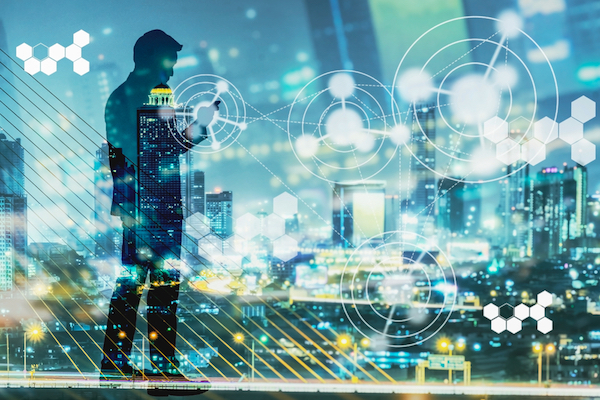
Dr Mohamed Chtatou
The third millennium saw the advent of the digital revolution in a very spectacular way: computers invaded every home and place of work, the Internet became as important as a morsel of bread, if not more. Satellite television revolutionized our taste, hype and culture and smart phones affected greatly our social habits. Thus, information and communications technology -ITC- became part and parcel of our daily life. Today, we all wonder, earnestly, how did we cope with life before this revolution?
Digital future for humanity
Back in the 60s of the last century, the visionary Canadian scientist Marshall McLuhan[i] prophesized the future omnipotence of ITC[ii] by arguing that the world will become a “planetary village” and so it became. The distances have shrunk dramatically allowing constant exchange between people and giving international trade an incredible boost, very beneficial to humanity at large.
This technology affected positively almost every area of our civilization: telemedicine has developed tremendously, electronic education spread all over the campuses and artificial intelligence has known quite a positive metamorphosis: driverless cars have made their apparition, drones are becoming normal accessories of life and sophisticated robots are rolling off assembly lines and apparently some of them can display humor and basic feelings.
For Henning Meyer, editor-in-Chief of Social Europe and a Research Associate of the Public Policy Group at the London School of Economics and Political Science, presents the digital revolution in the following words:[iii]
“The digital revolution, used here as shorthand for broader technological change, is one of today’s most hotly debated topics in politics, economics and business. It makes politicians wary about which preparatory policies to pursue, economists ponder productivity increases and trade unions think about the future of work. We are undoubtedly faced with large-scale disruptions in many areas that require adjustments.
Most people, however, are struggling to get a firm grip on the subject. They ask: what does this all mean for me and the organisations I am part of? What does technological change mean for my job? What kind of policies could be pursued in order to address these new challenges?
To analyse exposure to the digital revolution and potential policy solutions you need to start breaking it down into manageable dimensions. Three areas in particular warrant special attention: What are the forces shaping the application of new technologies? What does the digital revolution mean for the future of work? And what kind of policies could help to address these issues?”
Positive effects
ITC is definitely making our lives easy; we can communicate at will and on end, work from our homes and pay our standing bills online. We can consult our bank accounts day and night and make whatever transactions [iv]are necessary, including stock market operations. We can order food or a call a cab, buy an airline ticket and purchase any desired goods, any time we want and we can, also, choose our life partner as we want him or her to be.
The digital revolution is, of course, also, affecting greatly the economy: stock markets are all digitized to ease operations and to avoid potential crushes ahead of time. Of course, we all remember the horrific crush of the Wall Street on October 29, 1929 known as the Black Tuesday that ultimately led to the Great Depression that lasted until 1941 worldwide.
Social media has become an important aspect of our lives. We can talk to family and friends anytime, exchange photos and documents, play online, etc. Facebook has a membership of 3,5 billion around the globe; it is a social media for work, education, gossip and the pursuit for narcissistic inclinations. But, it is, also, a real forum of debate and discussion along with other social media and the home of cyber democracy in which people can express freely their ideas and criticism in total anonymity.
Thanks to the social media, the Arab Spring materialized and brought hope of change to this world suffocated for ages by harsh dictatorships and stifling tribal and patriarchal systems of governance. Prior to the advent the social media, demonstrators were easily detected by mukhabarat (political police) and arrested before they opened their mouth. With social media they were able to plan their protest, specify the venue and inform the world before the police knew and arrested them. They had, also, the possibility to stream their activities to the world to see and react to. In many ways one can say that social media was the powerhouse of the Arab uprisings.
In this regard, Heather Brown (journalist specialized in Arab media), Emily Guskin (journalist specialized in Hispanic media market) and Amy Mitchell (Director of Journalism Research) argue quite rightly:[v]
“Almost immediately after the Arab uprisings began, there was debate over the role and influence of social media in the ouster of Tunisian president Zine El Abidine Ben Ali and the imminent overthrow of Mubarak. In covering what some deemed the Facebook or Twitter revolutions, the media focused heavily on young protesters mobilizing in the streets in political opposition, smartphones in hand. And since then, the violent and sectarian unrest in Syria has brought increased attention to the role of citizen journalism.
Social media indeed played a part in the Arab uprisings. Networks formed online were crucial in organizing a core group of activists, specifically in Egypt. Civil society leaders in Arab countries emphasized the role of “the internet, mobile phones, and social media” in the protests. Additionally, digital media has been used by Arabs to exercise freedom of speech and as a space for civic engagement.”
Knowledge society
So, the applications of ITC are very beneficial because in many ways they are making life easy to everyone and what’s more computers are taking over many tasks and jobs done by humans and this however could have a negative effect on the long run if humans lose their bread winner occupations that could, ultimately, antagonize them and make them detest the use of machines.
The explosion of ITC all over the world is creating knowledge societies in which knowledge can be used by people equally to improve their lives and further their legitimate desire of better living conditions. Hence, UNESCO calls, with much strength, for building knowledge societies worldwide to create opportunities of wellbeing, wealth and happiness to all humans equally:[vi]
“Knowledge and information have significant impact on people’s lives. The sharing of knowledge and information, particularly through Information and Communication Technologies (ICTs) has the power to transform economies and societies. UNESCO works to create inclusive knowledge societies and empower local communities by increasing access to and preservation and sharing of information and knowledge in all of UNESCO’s domains. Knowledge societies must build on four pillars: freedom of expression; universal access to information and knowledge; respect for cultural and linguistic diversity; and quality education for all.”
Negative effects
The use of computers would push for general artificial intelligence, more sophisticated and more risky, a move that could rekindle machine phobia among humans as a result of the legitimate fear of seeing intelligent machines dominate humanity like in science fiction films. In this particular case, alas, the digital revolution could herald the end of humanity.
Another negative side effect of the digital revolution is that social media is somehow destroying the social fabric. Children spend most of their time on social media and neglect socializing with their parents and discussing their problems with them. Maybe in the future the concept of family will change dramatically to become anonymous of belonging and identity no more.
You can follow Professor Mohamed Chtatou on Twitter: @Ayurinu
End notes:
[i] http://www.telegraph.co.uk/technology/0/marshall-mcluhan-did-predict-internet/
[ii] http://robynbacken.com/text/nw_research.pdf
[iii] https://www.socialeurope.eu/understanding-digital-revolution-means
[iv] https://www.thebalance.com/the-great-depression-of-1929-3306033
[v] http://www.journalism.org/2012/11/28/role-social-media-arab-uprisings/
[vi] https://en.unesco.org/themes/building-knowledge-societies
References :
Boas, T., Dunning, T. & Bussell, J. (2005). “Will the Digital Revolution Revolutionize Development? Drawing Together the Debate”. In Studies in Comparative International Development, Summer 2005, 40 (2), 95-110. New York: Springer.
This concluding article returns to the broad question that motivates this special issue of Studies in Comparative International Development: Will the Digital Revolution constitute a revolution in development? In addressing this issue, we explore a number of common themes emphasized by the different contributions: the future of the North-South divide, the role of the state in promoting digital development, the transferability and adaptability of specific information and communication technologies, the challenges and potential benefits of controlling digital information, and the developmental effects of digitally enabled communities. We argue that the Digital Revolution’s ultimate impact on development will depend on several key variables, including the extent to which these technologies foster within-country linkages among different sectors and socioeconomic classes; the degree to which new technological applications may be customized or transformed to advance local development; and the outcome of political contests between organized interests that are promoting different ways of organizing and governing the global digital economy. While it is difficult to fully assess a transformation while living in the midst of it, research on the social, political, and economic implications of the Digital Revolution will constitute an important agenda for development scholars in the years to come.
Unwin, Tim. “Towards a Framework for the Use of ICT in Teacher Training in Africa.” Open Learning 20 (2005): 113-129. Unwin stresses the need for teacher training to achieve the Millennium Development Goals (MDGs) Africa has set for 2015.
The author also argues ICTs should not be limited to just computers and Internet, but offer a variety of learning solutions. The paper covers current initiatives designed to bring ICTs into African schools, including their successes and failures. Unwin advocates focusing on using ICT for education instead of just educating people on how to use ICTs. The author also advocates locally produced content so the curriculum is relevant. The paper discusses other principles of good practice as well. Unwin concludes by proposing a framework to put his principles into use.
Wasserman, Herman. “Mobile Phones, Popular Media, and Everyday African Democracy: Transmissions and Transgressions.” Popular Communication 9 (2011):146-158. Wasserman examines the effect mobile phones and other ICTs have in creating social change and enabling users to engage politically in Africa.
The paper includes criticisms from Malcolm Gladwell and others claiming social networking is low-risk participation. The author also discusses how readily Africa has adapted to mobile phone technology. Wasserman argues these phones have begun to bridge the digital divide. While the paper still points out limitations, it argues the technology has still changed Africa’s social practices. The article then discusses areas where mobile phones have made an impact in participation in government on both a national and local level. Wasserman also describes the business impact of mobile phones. Finally, the author examines the continent’s preference to use the technology to connect with local friends and family instead of the global network.
---30---

ABOUT US International Morocco is intended to be a special corner of exchange and learning, for free thinkers, creators, as well as for those beautiful hearts and minds, the intellectually and spiritually enlightened, from Morocco and beyond.
The digital economy’s environmental footprint is threatening the planet
December 8, 2019
Modern society has given significant attention to the promises of the digital economy over the past decade. But it has given little attention to its negative environmental footprint.
Our smartphones rely on rare earth metals, and cloud computing, data centres, artificial intelligence and cryptocurrencies consume large amounts of electricity, often sourced from coal-fired power plants.
These are crucial blind spots we must address if we hope to capture the full potential of the digital economy. Without urgent system-wide actions, the digital economy and green economy will be incompatible with each other and could lead to more greenhouse gas emissions, accelerate climate change and pose great threats to humanity.
Read more: How to make computers faster and climate friendly
The digital economy lacks a universal definition, but it entails the economic activities that result from billions of everyday online connections among people, businesses, devices, data and processes, from online banking to car sharing to social media.
It’s often referred to as the knowledge economy, information society or the internet economy. It relies on data as its fuel and it is already benefiting society in many ways, such as with medical diagnoses.
Coal is still king for the internet
Rare earth elements form the backbone of our modern digital technologies, from tablets and smartphones to televisions and electric cars.
China is the world’s largest producer of rare earth minerals, accounting for close to 70 per cent of global annual production. The large-scale production of rare earth elements in China has raised grave concerns about the release of heavy metals and radioactive materials into water bodies, soil and air near mine sites.
Research on the life-cycle assessments of rare earth minerals has found the production of these metals is far from environmentally sustainable, consuming large amounts of energy and generating radioactive emissions.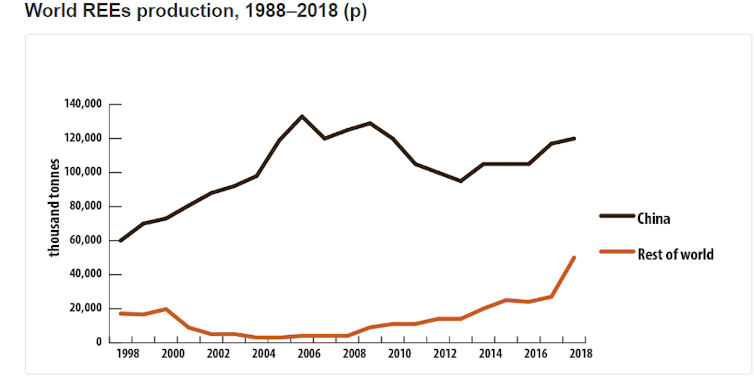 Preliminary data (p) on the global production of rare earth elements, 1988-2018. (Natural Resources Canada, 2019)
Preliminary data (p) on the global production of rare earth elements, 1988-2018. (Natural Resources Canada, 2019)
It’s sometimes said that the cloud (and the digital universe) begins with coal because digital traffic requires a vast and distributed physical infrastructure that consumes electricity.
Coal is one of the world’s largest sources of electricity and a key contributor to climate change. China and the United States are the top producers of coal.
Energy hogs
The world’s data centres — the storehouses for enormous quantities of information — consume about three per cent of the global electricity supply (more than the entire United Kingdom), and produce two per cent of global greenhouse gas emissions — roughly the same as global air travel.
A report by Greenpeace East Asia and the North China Electric Power University found that China’s data centres produced 99 million tonnes of carbon dioxide in 2018, the equivalent of about 21 million cars driven for one year.
Greenhouse gases aren’t the only type of pollution to be concerned about. Electronic waste (e-waste), which is a byproduct of data centre activities, accounts for two per cent of solid waste and 70 per cent of toxic waste in the United States.
Globally, the world produces as much as 50 million tonnes of electronic e-waste a year, worth over US$62.5 billion and more than the GDP of most countries. Only 20 per cent of this e-waste is recycled.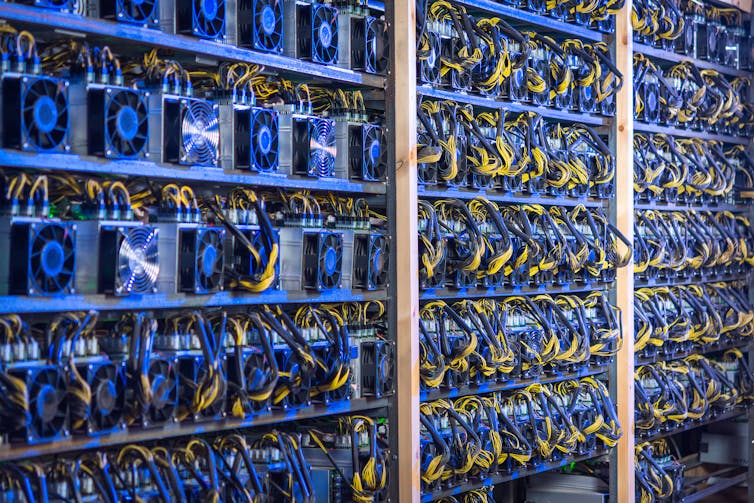 A Bitcoin mining farm. (Shutterstock)
A Bitcoin mining farm. (Shutterstock)
When it comes to AI, recent research found that training a large AI model — feeding large amounts of data into the computer system and asking for predictions — can emit more than 284 tonnes of carbon dioxide equivalent — nearly five times the lifetime emissions of the average American car. The results of this work show that there is a growing problem with AI’s digital footprint.
Another area of concern is Bitcoin and other cryptocurrencies, which rely on blockchain, a digital ledger with no central authority that continually records transactions among multiple computers. The amount of energy required to produce one dollar’s worth of Bitcoin is more than twice that required to mine the same value of copper, gold or platinum. A 2014 study found Bitcoin consumed as much energy as Ireland.
Blockchain technologies such as Bitcoin are energy inefficient and unless their potential applications are developed sustainably they will pose a serious threat to the environment.
Thinking differently
The digital economy is accelerating faster than the actions being taken in the green economy movement to counter negative environmental impacts. To move forward fast, we must first start thinking differently.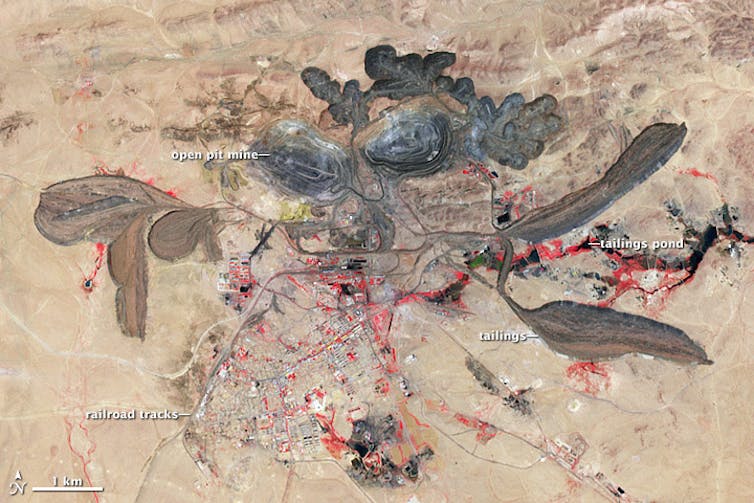 Satellite image of the Bayan Obo mine in China, taken on June 30, 2006. Vegetation appears in red, grassland is light brown, rocks are black and the water surfaces are green. (NASA Earth Observatory)
Satellite image of the Bayan Obo mine in China, taken on June 30, 2006. Vegetation appears in red, grassland is light brown, rocks are black and the water surfaces are green. (NASA Earth Observatory)
The world and its intractable challenges are not linear — everything connects to everything else. We must raise awareness about these major blind spots, embrace systems leadership (leading across boundaries), boost circular economy ideas (decoupling economic activity from the consumption of finite resources), leverage an eco-economics approach (an environmentally sustainable economy) and encourage policy-makers to explore the interrelationships between government-wide, system-wide and societal results.
We must also consider collective problem-solving by bringing together diverse perspectives from both the Global North and the Global South. We should take an inventory of the global and local damages caused by electronic devices, platforms and data systems, and frame issues about the digital economy and its environmental impact in broad societal terms.
Perhaps, the way to move the current discussion forward is to ask: What needs to be done to set the world on a sustainable human trajectory?
We must not only ask what the digital economy can do for us, but what we can collectively do for both the digital economy and the environment.
Author
 Raynold Wonder Alorse
Raynold Wonder Alorse
PhD Candidate in International Relations (International Political Economy of Mining), Queen's University, Ontario
Disclosure statement
Raynold has received funding from Public Governance International (PGI) for this research, as well as the Social Sciences and Humanities Research Council (SSHRC) of Canada for his doctoral program. Raynold serves as a Board Director and Chair of the Advocacy Committee for Nepean, Rideau and Osgoode Community Resource Centre (NROCRC), a non-profit organization serving vulnerable populations in Ottawa, including youth, seniors, children and newcomers to Canada.
Partners
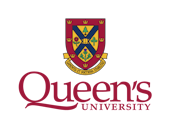

We believe in the free flow of information
Republish our articles for free, online or in print, under Creative Commons licence.Republish this article
Modern society has given significant attention to the promises of the digital economy over the past decade. But it has given little attention to its negative environmental footprint.
Our smartphones rely on rare earth metals, and cloud computing, data centres, artificial intelligence and cryptocurrencies consume large amounts of electricity, often sourced from coal-fired power plants.
These are crucial blind spots we must address if we hope to capture the full potential of the digital economy. Without urgent system-wide actions, the digital economy and green economy will be incompatible with each other and could lead to more greenhouse gas emissions, accelerate climate change and pose great threats to humanity.
Read more: How to make computers faster and climate friendly
The digital economy lacks a universal definition, but it entails the economic activities that result from billions of everyday online connections among people, businesses, devices, data and processes, from online banking to car sharing to social media.
It’s often referred to as the knowledge economy, information society or the internet economy. It relies on data as its fuel and it is already benefiting society in many ways, such as with medical diagnoses.
Coal is still king for the internet
Rare earth elements form the backbone of our modern digital technologies, from tablets and smartphones to televisions and electric cars.
China is the world’s largest producer of rare earth minerals, accounting for close to 70 per cent of global annual production. The large-scale production of rare earth elements in China has raised grave concerns about the release of heavy metals and radioactive materials into water bodies, soil and air near mine sites.
Research on the life-cycle assessments of rare earth minerals has found the production of these metals is far from environmentally sustainable, consuming large amounts of energy and generating radioactive emissions.
 Preliminary data (p) on the global production of rare earth elements, 1988-2018. (Natural Resources Canada, 2019)
Preliminary data (p) on the global production of rare earth elements, 1988-2018. (Natural Resources Canada, 2019)It’s sometimes said that the cloud (and the digital universe) begins with coal because digital traffic requires a vast and distributed physical infrastructure that consumes electricity.
Coal is one of the world’s largest sources of electricity and a key contributor to climate change. China and the United States are the top producers of coal.
Energy hogs
The world’s data centres — the storehouses for enormous quantities of information — consume about three per cent of the global electricity supply (more than the entire United Kingdom), and produce two per cent of global greenhouse gas emissions — roughly the same as global air travel.
A report by Greenpeace East Asia and the North China Electric Power University found that China’s data centres produced 99 million tonnes of carbon dioxide in 2018, the equivalent of about 21 million cars driven for one year.
Greenhouse gases aren’t the only type of pollution to be concerned about. Electronic waste (e-waste), which is a byproduct of data centre activities, accounts for two per cent of solid waste and 70 per cent of toxic waste in the United States.
Globally, the world produces as much as 50 million tonnes of electronic e-waste a year, worth over US$62.5 billion and more than the GDP of most countries. Only 20 per cent of this e-waste is recycled.
 A Bitcoin mining farm. (Shutterstock)
A Bitcoin mining farm. (Shutterstock)When it comes to AI, recent research found that training a large AI model — feeding large amounts of data into the computer system and asking for predictions — can emit more than 284 tonnes of carbon dioxide equivalent — nearly five times the lifetime emissions of the average American car. The results of this work show that there is a growing problem with AI’s digital footprint.
Another area of concern is Bitcoin and other cryptocurrencies, which rely on blockchain, a digital ledger with no central authority that continually records transactions among multiple computers. The amount of energy required to produce one dollar’s worth of Bitcoin is more than twice that required to mine the same value of copper, gold or platinum. A 2014 study found Bitcoin consumed as much energy as Ireland.
Blockchain technologies such as Bitcoin are energy inefficient and unless their potential applications are developed sustainably they will pose a serious threat to the environment.
Thinking differently
The digital economy is accelerating faster than the actions being taken in the green economy movement to counter negative environmental impacts. To move forward fast, we must first start thinking differently.
 Satellite image of the Bayan Obo mine in China, taken on June 30, 2006. Vegetation appears in red, grassland is light brown, rocks are black and the water surfaces are green. (NASA Earth Observatory)
Satellite image of the Bayan Obo mine in China, taken on June 30, 2006. Vegetation appears in red, grassland is light brown, rocks are black and the water surfaces are green. (NASA Earth Observatory)The world and its intractable challenges are not linear — everything connects to everything else. We must raise awareness about these major blind spots, embrace systems leadership (leading across boundaries), boost circular economy ideas (decoupling economic activity from the consumption of finite resources), leverage an eco-economics approach (an environmentally sustainable economy) and encourage policy-makers to explore the interrelationships between government-wide, system-wide and societal results.
We must also consider collective problem-solving by bringing together diverse perspectives from both the Global North and the Global South. We should take an inventory of the global and local damages caused by electronic devices, platforms and data systems, and frame issues about the digital economy and its environmental impact in broad societal terms.
Perhaps, the way to move the current discussion forward is to ask: What needs to be done to set the world on a sustainable human trajectory?
We must not only ask what the digital economy can do for us, but what we can collectively do for both the digital economy and the environment.
---30---
Author
PhD Candidate in International Relations (International Political Economy of Mining), Queen's University, Ontario
Disclosure statement
Raynold has received funding from Public Governance International (PGI) for this research, as well as the Social Sciences and Humanities Research Council (SSHRC) of Canada for his doctoral program. Raynold serves as a Board Director and Chair of the Advocacy Committee for Nepean, Rideau and Osgoode Community Resource Centre (NROCRC), a non-profit organization serving vulnerable populations in Ottawa, including youth, seniors, children and newcomers to Canada.
Partners


We believe in the free flow of information
Republish our articles for free, online or in print, under Creative Commons licence.Republish this article
No comments:
Post a Comment